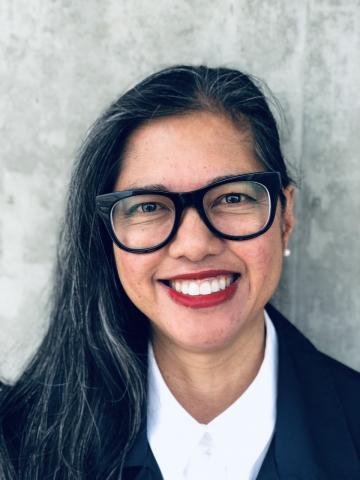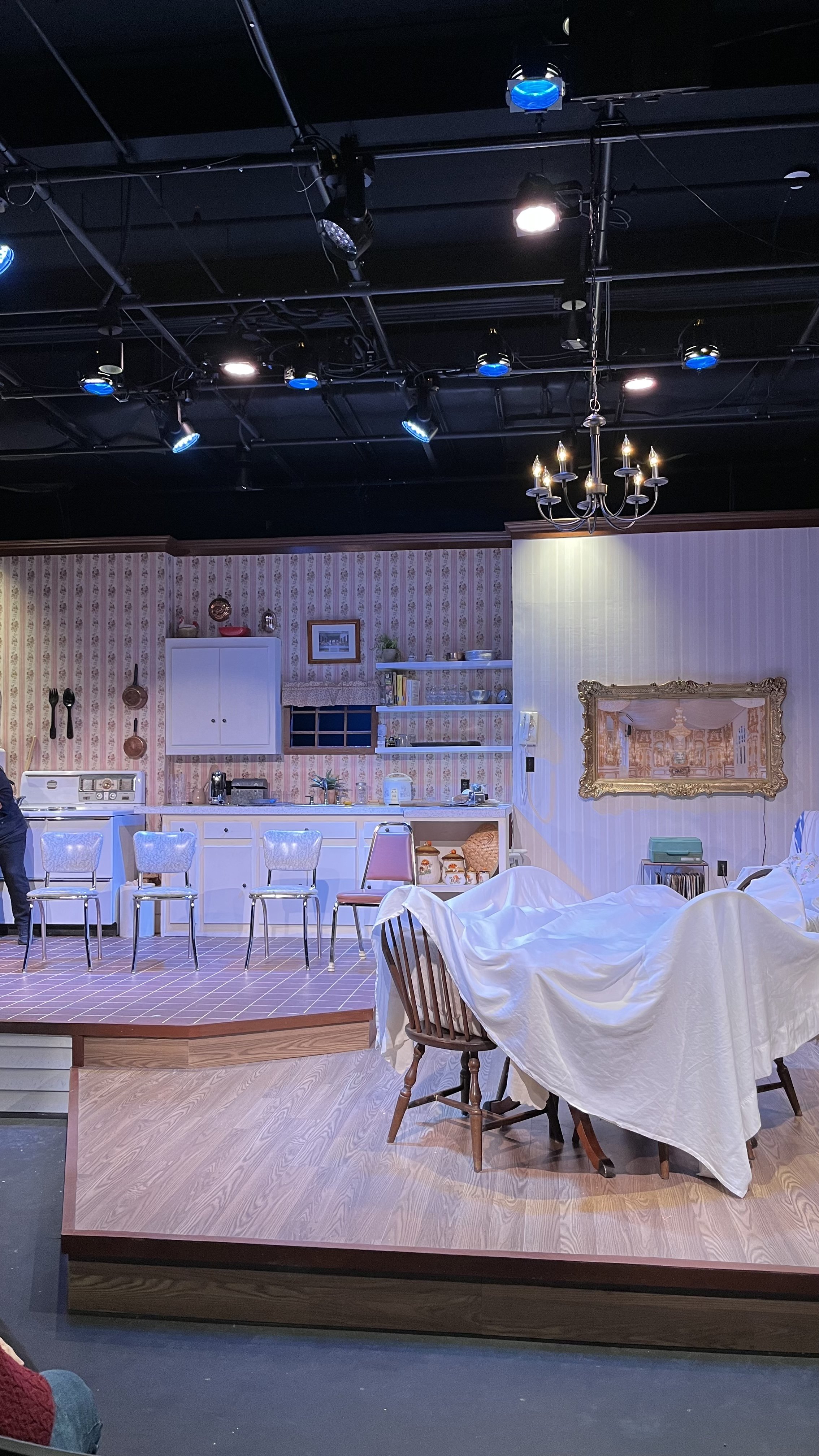Hortense Gerardo: Storyteller of Filipinos “Simply Being”
By Jo Malicdem
Hortense Gerardo
In the Umbrella Stage Company’s production, Middleton Heights, playwright Hortense Gerardo illuminates the story of a Filipino family in the Midwest and their dinner table discussions over the span of forty years.
“I felt that there isn't enough representation of Filipinos who are simply just being, you know, a simple American family who happen to be Filipino,” shares Gerardo.
Presented in a black box theater at the Umbrella Arts Center in Concord, MA, Middleton Heights ran from March 23 to April 23 of this year with each show running for one hour and 50 minutes. The production attracted Filipino audiences from all over the Northeast who would go on to engage in a community-wide game of ‘I Spy’ to keep an eye out for iconic Pinoy household items on set.
Gerardo has quite the rotation of hats she wears. She is the Director of the Anthropology, Performance, and Technology (APT) Program at University of California, San Diego. Gerardo is a film director, movement choreographer, and playwright. With numerous works that have been performed nationally and internationally, Gerardo is also a co-founder of the Asian American Playwrights Collective (AAPC).
The Umbrella Arts Center, photo by Jo Malicdem
Born in Nashville, Tennessee during her parents’ medical residencies at Vanderbilt University, Gerardo and her brother’s U.S. citizenship served as tickets back to the States when her parents’ work visas expired. The bunch returned to the United States within two years and moved to a suburb of Cleveland, Ohio, where her aunt resided.
“[I had] a very happy childhood. I was very blessed that my parents chose the place where we grew up, because it was like a Leave It to Beaver episode…” Gerardo explained. “We were blessed because we did not experience racism. At least I didn't overtly, maybe it was happening in such a subtle way that I wasn't aware of it.”
It wasn’t until Gerardo grew up and would reflect on how her experience as a person of color differed from the experiences of other people of color in Cleveland. Contemplating the cognitive dissonance between her own personal experience growing up in that area, versus what other people of color reckoned with, can be pinpointed as part of the genesis of Middleton Heights. “I’m still exploring it, actually,” said Gerardo.
While it was always assumed for Gerardo to follow in her parents’ footsteps as a physician, Gerardo has always been fond of writing. In the ‘80s, she attended “The Real Thing,” written by Tom Stoppard.
“It was the first time I'd seen a play that wasn't Shakespeare. It wasn't written by a dead, white playwright. And I really, really identified with it… I thought: someday I'm gonna write for the stage.”
In 2002, Gerardo was accepted into the University Professors Program at Boston University. This allowed her to get a dual degree in Anthropology and Performance Arts. Due to her studies, Gerardo only had time to work on shorter length plays. In 2005, Gerardo sent these plays out and got them produced through the Boston Theater Marathon and the Playwrights’ Platform annual festival.
Gerardo was accepted into the Pao Arts Center’s Company One Playlab Fellowship in 2017, a residency that supports emerging Asian Pacific Islander (API) playwrights. “The world opened up once I finally let go and stopped striving to have the most perfect piece,” she expressed. “It doesn't exist... Since then, I've been sharing my work more, and thankfully, I've been getting produced more as a result.”
While Middleton Heights is not an autobiographical piece, which Gerardo stresses, it is certainly informed by her experiences. Middleton Heights was a product of concern in the aftermath of the killing of Tamir Rice in 2014. Gerardo found herself inspired by the conversations around the dinner table that Thanksgiving.
“We didn't all agree on our politics. We're all different in my family, but it was interesting to hear those disparities of opinion,” said Gerardo.
Some scenes from Middleton Heights began as ten minute plays that Gerardo had written over the years. There is one scene that was originally written and performed at the Boston Theatre Marathon in 2006, according to Gerardo.
“I never connected any of these ten minute plays into a full storyline, because I had always been told that it would be impossible to cast an all-Filipino full-length production, based on the Filipino-American experience,” Gerardo shared. “And so, I always just kind of hung back on writing that great big magnum opus work that was going to be about the Filipino experience.”
When COVID-19 first hit, several theater companies had decided to take a risk on “relatively unknown” playwrights, according to Gerardo. “They were presenting the works on Zoom, and so there was relatively low financial risk to dipping into the local theater community in Boston.”
In 2020, Incantation, a play Gerardo wrote specifically to be performed on Zoom, was picked up and produced by The Umbrella Stage. Because it was received so well, Brian Boruta, Umbrella’s Director of Performing Arts, sought to pick up and produce more of Gerardo’s work. Soon enough, Hortense Gerardo was The Umbrella Stage’s first commissioned playwright.
The Umbrella Stage wanted to present a production that was warm, familial, and community-centered. Due to the ongoing coronavirus pandemic, they sought out a play that wouldn’t discourage audiences with heavier content.
The set of Middleton Heights, photo by Jo Malicdem
“That's when I really started thinking to myself: well, I have all these ten minute plays that I didn't know what to do with, but they all centered around this fictional world informed by my own experience that I've been writing over all these years,” noted Gerardo.
Middleton Heights and many of Gerardo’s other plays, films, and movement works all begin with a question. “Whether it’s a character-based project or a situationally-based project, I start asking questions. The way that I begin to answer those questions inform the medium that project will eventually manifest,” said Gerardo.
“What I love about playwriting and screenwriting is, you can convey a lot of information that will actually get out to a larger audience,” she expanded. On the other hand, Gerardo pointed out that academic journals typically reach only other academics and social scientists, but aren't as accessible to the general public.
In 2021, an excerpt of Middleton Heights was supposed to premiere at Umbrella Arts, but didn’t get to due to the Omicron wave. Following another COVID wave in 2022, the play was postponed again. Finally, in winter of 2023, auditions for Middleton Heights were held, and Gerardo was blown away at the turnout. “There were so many really talented Asian American and Pacific Islander actors who showed up not only from the Boston area, but from the rest of the country.”
Hortense hoped to convey the normalcy of being a Filipino American. “I felt that there isn't enough representation of Filipinos who are simply just being. [This is a] simple American family who just happens to be Filipino.”
Middleton Heights prompts audiences to reevaluate the American Dream: who it is targeting, who it actually serves, how this notion has affected their own upbringings or careers, and whether the dream still holds up to its end of the bargain.
“The American Dream is positive in one sense, because it incentivizes people to try…they are less likely to give up hope because they have dreams they can hang on to and go towards. The problem is when it becomes the sole engine of motivation. It can shutter people to the other social issues that prevent people from attaining goals,” explained Gerardo.
The idea of not “making it” being a result of not trying hard enough, being talented or smart enough, is an underlying, widespread social weight. “This myth of meritocracy is dangerous rhetoric to be perpetuated,” states Gerardo.
The opportunities advertised in the American Dream are not provided equally to people – most immigrants are barred from these opportunities. Gerardo’s hope is for more people to reckon with the consequences of the American Dream, which will in turn allow the elimination of opportunity disparities.
In many instances, immigrants like Gerardo’s parents understand that their physical quality of life, and the means that they had at their disposal in their home country, were no longer going to be available to them in America. “In fact, they were going to be living a harder life by coming to America,” she explains. “I think this is something that’s really hard for non-immigrants to understand.”
As more Filipino stories can be found on the screen and stage, Gerardo hopes that these stories will become universal stories.
“Ironically, the ideal situation would eventually come to pass that these would no longer be stories like Filipino stories, right? These would become universal stories, that I would be known as a playwright, not a Filipino playwright, because we don't put those identifiers on other playwrights who are not people of color, right? Nevertheless, we're a long way from that. And I actually happen to be enjoying leaning into reclaiming a lot of the history and the stories and examining those through the lens of the Filipino American experience. So I think because we're at a time of identity politics, and people are really examining our individual roles and what makes up a community and our role in a social contract, these stories will have more relevance. It's what I hope for, as an anthropologist and as a playwright.”
Hortense Gerardo thanks everyone involved in Middleton Heights: Brian Boruta at The Umbrella Stage and Michelle Aguillon, the “incredible” cast, the “unbelievable” production team. “It’s just such a gift for a playwright to be able to have this opportunity to see their words being brought to life.”
From October 26 to 29, Gerardo will be conducting performance lecture “Beyond the Black Box: Four Exploration in Embodied Interaction” as part of the 2023 Society for Literature, Science, and the Arts Conference in Tempe, Arizona
The Burlington Players is set to produce Gerardo’s one-act play, Chagrin Valley, from February 23 to March 9, 2024.
The Asian American Playwright Collective (AAPC) Playfest Anthology Volume 6 is available now.
To learn more about Hortense Gerardo’s work and upcoming projects, visit her website.



